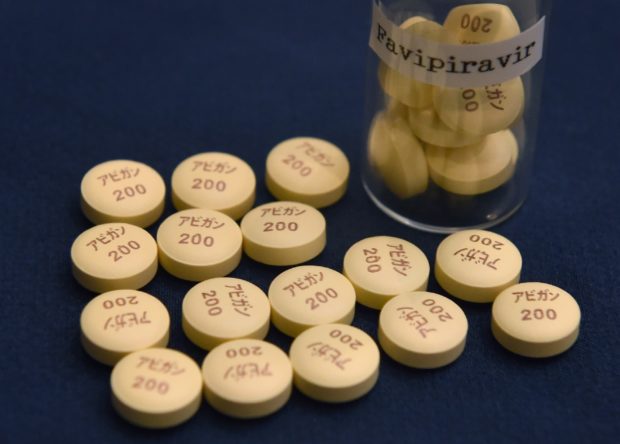Avigan: Antiviral being tested for coronavirus patients

The flu-treatment drug Avigan, produced by Japan’s Fujifilm, on display in Tokyo (Image: AFP/Kazuhiro Nogi)
It is approved for use in flu outbreaks and has been deployed to treat Ebola, but now Avigan is being trialed as a potential coronavirus treatment.
Here are some questions and answers about the anti-viral medication:
What is Avigan?
Avigan is the brand name of the drug favipiravir. It was developed by what is now known as Fujifilm Toyama Chemical and approved for use in Japan in 2014.
But in Japan, it is only approved for use in flu outbreaks that aren’t being effectively addressed by existing medications. It is not available on the market and can only be manufactured and distributed at the request of the Japanese government.
Favipiravir works by blocking the ability of a virus to replicate inside a cell.
There are some safety concerns: it has been shown in animal studies to affect fetal development, meaning it is not given to pregnant women, and some doctors say they would not recommend it for children or adolescents.
How is it being used to treat coronavirus?
Some doctors began trying favipiravir to treat coronavirus patients early on, reasoning that its anti-viral properties would be applicable.
Some initial results suggested the drug could help shorten recovery time for patients, with China’s Ministry of Sience and Technology hailing it as yielding “very good clinical results.”
There are currently around five clinical trials ongoing in countries including the United States, Italy and Japan, where Fujifilm announced it would be testing the drug’s efficacy on a group of 100 patients through until the end of June.
The Japan study will involve administering the drug for up to 14 days to patients between 20 and 74 with mild pneumonia.
Gaetan Burgio, a geneticist at Australian National University’s College of Health and Medicine, said the trials would be looking at a variety of factors.
They include clinical outcomes—meaning effects on fever, cough, oxygenation, recovery time and time spent in hospital—as well as how quickly the virus clears the system, along with x-rays or CT scans for pneumonia.
“If we see a significant reduction in clinical outcome and lower viral load from the favipiravir group, this would be a good sign for a larger-scale clinical trial,” he told Agence France-Presse.
What sets these trials apart?
While doctors have already been experimenting with favipiravir for treating coronavirus patients, these trials will be conducted according to rigorous guidelines intended to ensure the drug is safe and effective across a broad range of patients.
“Smaller studies have been reported, but it’s hard to draw conclusions from these as patient numbers are small and the trials often don’t compare versus (a regime of) best supportive care and placebo, more often to another drug,” said Stephen Griffin, a virologist at the University of Leeds.
“The big trials should be segregated according to disease severity and will compare to placebo.”
How does it compare to other drugs?
Scientists are studying a wide variety of drugs for possible treatment of coronavirus patients, including remdesivir, another antiviral.
One study of the two drugs as a treatment for coronavirus found favipiravir was only effective at relatively high concentrations, with remdesivir considered a better option, possibly in part due to the way coronaviruses replicate compared to other viruses, said Griffin.
But remdesivir is not yet licensed anywhere in the world and has to be administered intravenously via a drip, whereas favipiravir is approved in several countries and can be taken orally as a pill.
Japan has heavily backed the drug, asking Fujifilm to ramp up production for use at home and offering to supply it for free to dozens of countries that have put in requests.
When will we know if it works?
Fujifilm’s Japan and US trials will run until the end of June, with other data coming in from trials in Italy and elsewhere. Additional information will also be available from so-called compassionate use of the drug by doctors offering it to patients in non-study settings where other medication is not working.
But Burgio cautioned against high hopes.
“There are to date over 300 clinical trials underway for COVID-19. The expectations are very high for a miracle drug!”
“Let’s wait and see. However, rather than drugs, the best treatment against COVID-19 for now is social isolation, wash our hands and stay at home.” CL /ra
RELATED STORIES:
PH willing to join clinical trials for COVID-19 drug
Insomnia a major issue for healthcare workers fighting COVID-19
For more news about the novel coronavirus click here.
What you need to know about Coronavirus.
For more information on COVID-19, call the DOH Hotline: (02) 86517800 local 1149/1150.
The Inquirer Foundation supports our healthcare frontliners and is still accepting cash donations to be deposited at Banco de Oro (BDO) current account #007960018860 or donate through PayMaya using this link.